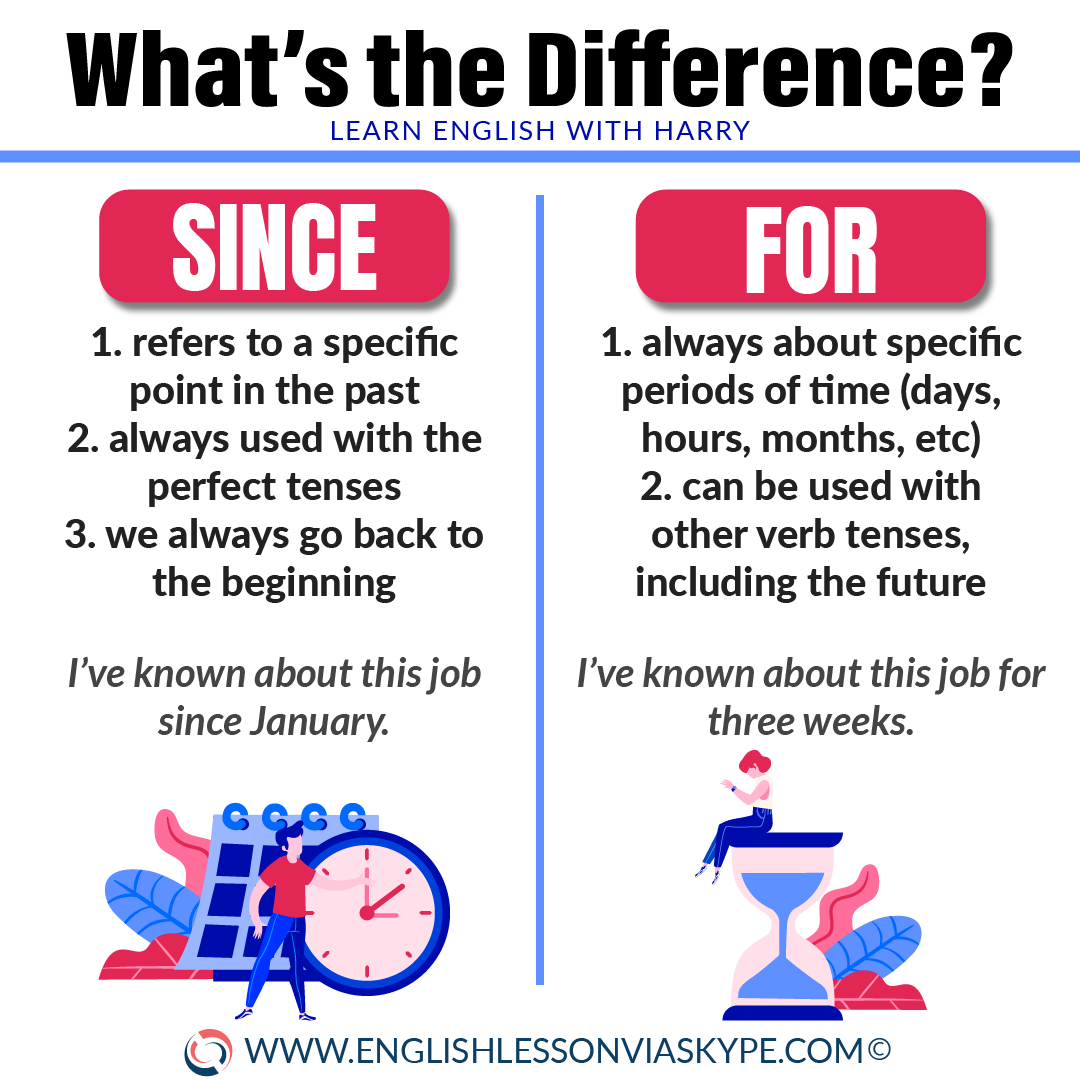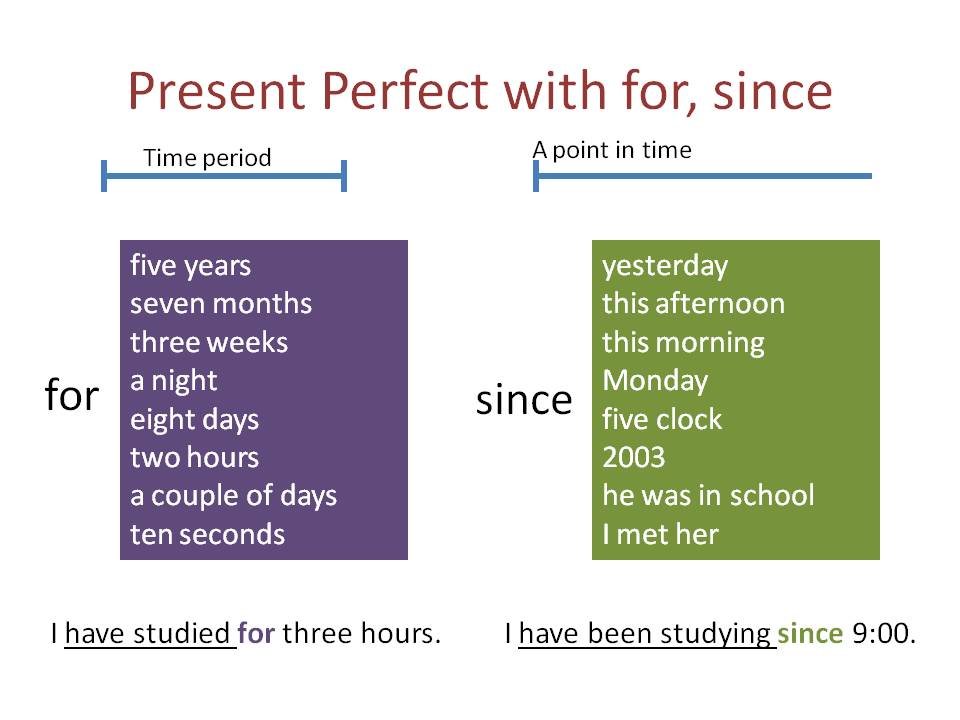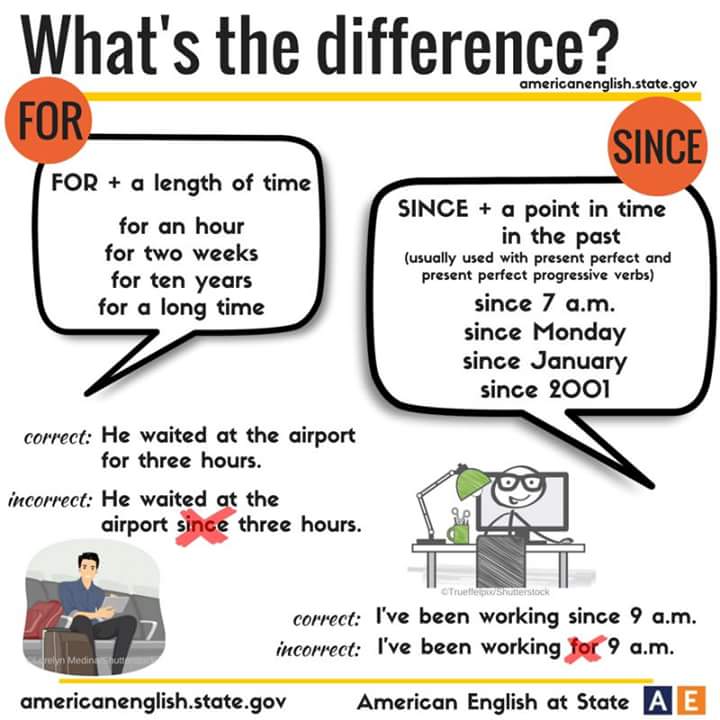
Quelle est la différence entre for, since et ago en anglais?
Since et for - cours Attention, en français : Since et for = depuis. 'FOR' est utilisé pour indiquer une durée. - For three days, depuis 3 jours - F or a week, - F or several years, - For two centuries. Par exemple : I've been waiting for you for 3 hours. Je t'attends depuis 3 heures.

Difference between SINCE and FOR • Learn English with Harry 👴
For, since, from - Grammar chart. Download full-size image from Pinterest For vs since. We can use for and since with present perfect or past perfect simple or continuous.. We use for + a period of time, e.g. for two weeks, for ten years, for ten days, for a few hours, etc. We' ve been here for a few hours. He 's been studying for a long time.

SINCE vs FOR Learn english grammar, Learn english words, English lessons
English English grammar Using for, since, during in English There are a lot of prepositions in English can be used in sentences. You can learn them from that page and use them efficiently and accurately in your daily life. Adelaide A. Updated September 8, 2023 4 min read This author is a Preply tutor!

For vs Since
Everyday Grammar For or Since: What Is the Difference? December 10, 2015 0:00 0:02:00 Everyday Grammar: For & Since Have you ever wondered how to talk about an event that began in the past and.

FOR vs SINCE in English English Study Here
La différence entre for et since en anglais. Bête noire des francophones qui entament leur apprentissage de la grammaire anglaise, la différence entre for et since n'est pourtant pas compliquée !. La règle est la suivante : on utilise for avec une période de temps dans le passé, le présent ou le futur, et on utilise since avec un moment précis dans le passé.

For or since ? English Grammar Today
Since vs For Exercise Watch on Complete the following sentences by using for or since. 1. They have been living in Madrid 1972. 2. He has been in the hospital four days. 3. He has known about the place a long time. 4. Conditions have changed a lot we were children. 5. Our teacher has been sick last week. 6.

La vraie différence entre SINCE et FOR ! YouTube
When for is used with respect to time, it refers to the period of time to express how long something persists. Now come let's understand its uses, with the points given below: To indicate the time period : I am waiting for the Project guide for an hour. My cousin uncle lived for 50 years. I lived in Pune for two years.

Pin on Grammar in English
When do you use "for" and when do you use "since"? It's tricky, but thanks to Arnold, you'll never confuse them again! Find out more about our face to face E.

English Blog Castroverde Present Perfect with for and since
Since + Point in Time. Since shows us the fixed point when an action started.; Example: They have been in Berlin since Friday. They arrived in Berlin on Friday. We cannot use since with time periods, we only use since with a fixed time point, such as yesterday, last week, the 12th of March etc.; Example: They have been waiting since 7 o'clock in the morning.. We use since with the present.

FOR vs. SINCE in English Grammar Lesson YouTube
How to Use Since and For Using since and for correctly isn't all that difficult, but unfortunately the rules for these two words are often explained in overly complicated ways. So complicated, in fact, that very smart people whose English is basically perfect still occasionally get them wrong.

Comment (enfin) différencier since et for en anglais ? Apprendre l'Anglais Naturellement
have, had → had lose, lost → lost. do, did → done eat, ate → eaten. We use the present perfect to talk about present activities that started in the past. We use for to talk about the period of time up to the present, e.g. for four years, for two days. The company has been in business for four years. We use since to talk about the time.

Sheet สอน Artofit
3. I haven't seen him since Monday. 4. It has been a long time since I watched a movie. 5. She has been learning English for six months. 6. I have known him since our school days. 7. It hasn't stopped raining since yesterday. 8. She has been unemployed since she left college. 9. It has been a long time since we last met. 10.

For or since? Interactive worksheet apprendreanglais,apprendreanglaisenfant,anglaisfacile
The word 'since', on the other hand, refers to a particular point of time from when the action started/began in the past to the present. It indicates that the action is continuing. For example, 'Raj has been living in London since 2003.' Examples of For and Since Here are a few more examples to help you understand how the two prepositions are used.

Since et for différences et temps à utiliser (fiche) AuFutur
- Grammar - Cambridge Dictionary For or since? Grammar > Easily confused words > For or since? from English Grammar Today We use for with a period of time in the past, present or future. We use since with a point in time in the past. Compare Warning: We don't use since with periods of time: She's been on the phone for hours.

What’s the Difference FOR and SINCE Materials For Learning English
Present Perfect — since/for. Choose since or for from the drop-down menu. 1. They have lived here. since for. July. since. 2. She has been a teacher.

For Since لاينز
For /since - exercises. Free grammar exercises online . Elementary and beginners levels esl exercises